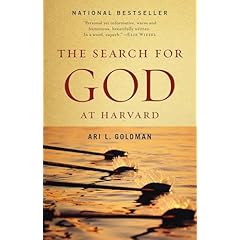 I actually bought this book on a visit to Harvard. I applied to the Divinity school there a few years ago. I didn't get in. Who knows what could have happened had I been admitted? Where would I be?
I actually bought this book on a visit to Harvard. I applied to the Divinity school there a few years ago. I didn't get in. Who knows what could have happened had I been admitted? Where would I be?
Ari Goldman did get in. He was a religion reporter for the New York Times, and in 1985 enrolled to learn more about other religions so he could write better news stories. But, in the process, he learned a lot about himself.
The study of religion is an interesting topic, mainly because so many people want to study it or claim to be able to teach it. But, theological and religious education happens all over America, and might just be done better outside the walls of institutions and churches.
Goldman's book is a chronicle of his year at HDS, but it delves too deeply into his life that it quickly turns into his autobiography, and I'm not interested in reading that.
I was hoping for more of an expose on how religion and theology are taught at one of the most prestigious universities in the world. As it turns out, it's nearly the same as other top tier schools. There are brilliant and controversial professors; a diversity of religious expression is available; lots of people are looking for something more than a degree.
Most graduate educations today are trade schools. An extra sheet of paper on your wall can open doors to interviews and jobs, but your expertise is narrow. However, as many folks today are learning, a divinity degree opens the door to working in a church, doctoral studies, or a job that your extra degree did nothing to prepare you for. So why do people get a religious education?
Lots choose to go to theological- or denomination- specific schools. They want to learn more about a certain theology or follow the path that leads to ordination in their specific faith tradition.
Other schools, like Harvard (and Vanderbilt, where I'm currently enrolled), aren't as specific. Not bound by denominational or church funding, courses vary and students can get a broad exposure to a variety of material (which is one of the major reasons I chose Vandy).
But in either setting (narrow or broad), many students seem to be looking for something.
Many claim they want a seminary degree to learn more about God. Some are looking for truth. As Ari's book suggests, some are simply trying to 'find' God.
I think that God might just be more present outside of a religious curriculum. Indeed, I would say that God has largely been missing for many institutions of higher education for some time. I've never found God in a classroom. And that's because, for me, God is outside of any walls we build, actual or metaphorical.
One of the few quotes I enjoyed from Goldman was:
To my mind, the law is meant to be challenged in the real world. That is where it comes alive, not in 'safe' professions, like teaching, or the Orthodox-dominated world of 47th Street.
If all we (those with graduate religious-related degrees) is talk about what people said when they talked about God, we're risking missing the movement of God in the world. We've got to hop on board.
The only people I would recommend this book to are those thinking of going to seminary. Whether you lack alternatives, think you might like it, or feel you have some sort of passion or calling, read the book. It might make you rethink the steps you're planning on taking. Because just maybe, you can learn about and serve God without an extra graduation.